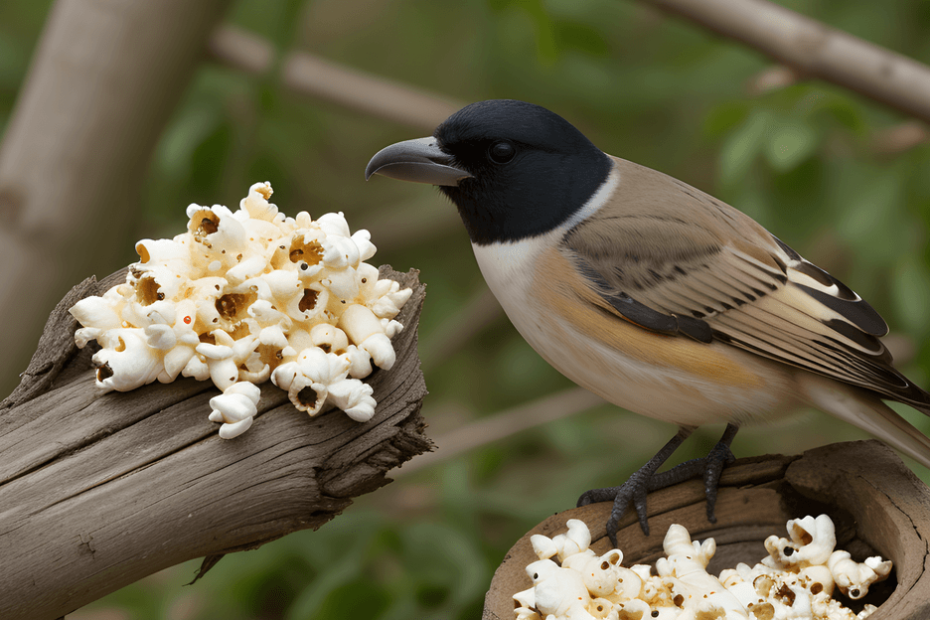Key Takeaways
- Choose the Right Popcorn: Opt for plain, unsalted, and unbuttered popcorn for feeding birds to ensure their safety and health.
- Understand the Risks: Be aware of the potential hazards of feeding popcorn to birds, including choking and digestive issues, and take necessary precautions.
- Consider Nutritional Value: Evaluate the nutritional content of popcorn before offering it to finches, ensuring that it complements their dietary needs.
- Select Suitable Varieties: Prioritize safe popcorn varieties such as air-popped or organic kernels to minimize potential harm to birds.
- Tailor to backyard birds: Recognize that different bird species may react differently to popcorn, so adjust feeding practices accordingly.
- Explore Healthy Alternatives: Introduce alternative bird treats for feeding backyard birds, considering options beyond popcorn.
Introduction
I’ve often wondered about the impact of feeding popcorn pieces to wild birds. It’s a common sight at parks and outdoor events, but is it safe for birds? In this post, we’ll delve into this question and explore the potential risks and benefits associated with birds consuming popcorn seasoned with primary sources.
As we consider this issue, it’s important to recognize that while popcorn may seem like a harmless treat, there are various factors to ponder. We’ll examine the historical context of wild bird feeding practices and how they have evolved. We’ll discuss the nutritional implications for birds when they consume popcorn and whether it aligns with their natural dietary needs.
Should Birds Eat Popcorn?
Unsalted and Unbuttered
It’s crucial to ensure that the popcorn snack is unsalted and unbuttered. Salt, butter, and corn can be harmful to birds, affecting their delicate digestive systems. Opt for plain, air-popped popcorn without any added seasoning.
Popcorn with salt or seasoning can lead to dehydration in backyard birds if consumed in large quantities. The high sodium content in salted popcorn can disrupt the electrolyte balance in a bird’s body, while the fat content in buttered popcorn might not sit well with their stomachs.
Microwave Popcorn Caution
Avoid microwave popcorn with added seasoning when considering feeding it to birds. Many commercially available microwave popcorn products contain artificial flavorings and seasoning, preservatives, and additives that are not suitable for avian consumption.
Some of these additives may include chemicals like diacetyl, seasoning, and corn, which can be harmful when ingested by birds. The steam from freshly popped microwave popcorn, as well as the seasoning, could also pose a risk due to its temperature; this could potentially burn a bird’s sensitive mouth or throat if they were to consume it too quickly after popping.
Organic and Non-GMO
When offering popcorn as a treat for backyard or wild birds, ensure that it is organic and non-GMO. This reduces the risk of exposing birds to pesticides or genetically modified organisms that could have adverse effects on their health.
Organic corn ensures that no synthetic pesticides or fertilizers have been used during cultivation. Similarly, non-GMO corn guarantees that the crop has not been genetically modified using modern biotechnology techniques.
I’ve found that air-popping organic corn kernels at home provide an excellent way of ensuring safe and healthy treats for our feathered friends! I always make sure there are no unpopped corn kernels left behind as they might pose choking hazards for small birds.
Understanding the Risks of Popcorn for Birds
Choking Hazard
Popcorn can pose a choking hazard to birds due to the hard hulls. These corn hulls, also known as kernels, can get lodged in a bird’s throat or digestive system, leading to serious health issues. The sharp edges of the hulls can cause damage internally.
I once witnessed a bird struggling with a piece of popcorn and learned firsthand how dangerous it can be. It’s crucial to ensure that any snacks given to birds are free from potential choking hazards like popcorn hulls.
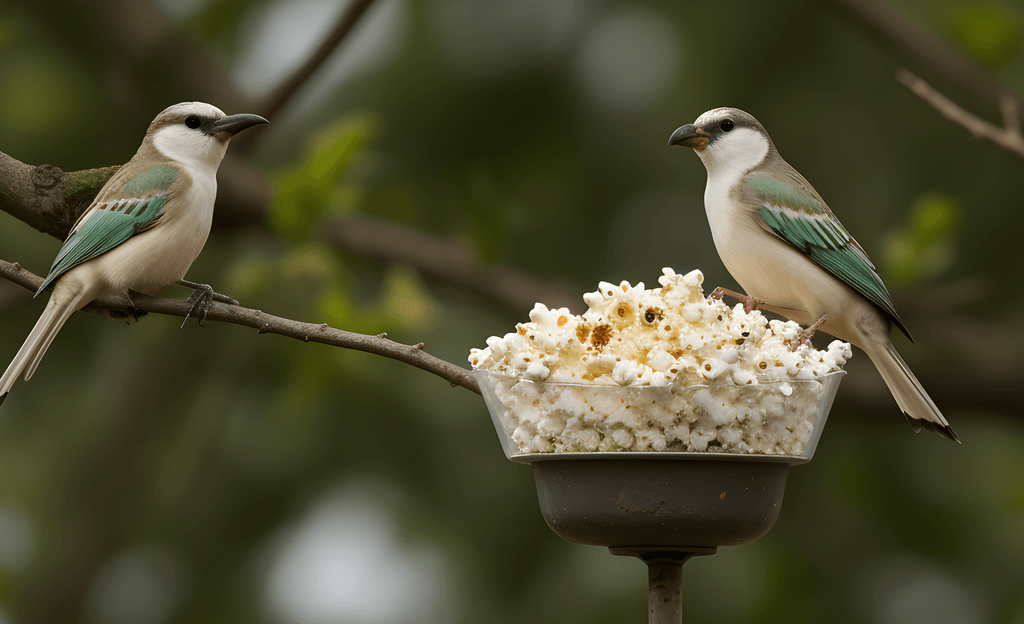
High Sodium and Fat Content
Flavored popcorn, especially those with added salt or butter, contains high levels of sodium and fat, which are harmful to birds when consumed in excess. Birds have delicate systems that cannot handle excessive amounts of sodium and fat, potentially leading to heart problems or obesity.
I always make sure not to offer my pet birds flavored popcorn because I understand the risks associated with high sodium and fat content in their diet. It’s important for all bird owners to be mindful of these risks when considering giving them popcorn.
Nutritional Imbalances
Overconsumption of popcorn by birds can lead to nutritional imbalances. While it may seem harmless as an occasional treat, too much popcorn could fill up a bird without providing essential nutrients they need from their regular diet.
I’ve read about cases where pet birds developed health issues due to overindulging in treats like popcorn. This made me realize the importance of maintaining a balanced diet for our feathered friends and being cautious about offering corn that could disrupt their nutritional intake.
Preparing Popcorn for Avian Diets
Air-Popped or Plain Stovetop Popcorn
Air-popped or plain stovetop popcorn is the most suitable for feeding birds. Avoid salted, buttered, or flavored corn varieties as they can be harmful to avian health. When preparing popcorn for birds, it’s crucial to ensure that no additives are present.
Offering plain popcorn ensures that your pet birds are not exposed to potentially harmful substances like excessive sodium and artificial flavorings. This aligns with the principle of providing a varied diet that includes wholesome grains such as corn without compromising their well-being.
Removing Unpopped Kernels
Before offering popcorn to birds, it’s essential to meticulously remove any unpopped kernels. These hard pieces can pose a choking hazard and may also cause injury to the bird’s delicate digestive system if ingested accidentally.
By removing unpopped kernels from the batch of prepared popcorn, you’re actively safeguarding your pet birds from potential harm while also ensuring that they can enjoy this occasional treat safely.
Breaking into Bird-Friendly Sizes
To make popcorn more accessible and safer for consumption by pet birds such as parrots, finches, or chickens, it’s advisable to break large pieces into smaller, bird-friendly sizes. By doing so, you’re facilitating easier consumption and reducing the risk of choking incidents.
Breaking large pieces of popcorn into smaller portions allows your feathered companions to indulge in this snack without struggling with oversized morsels. It promotes a positive feeding experience while minimizing potential hazards associated with consuming oversized food items.
In my experience caring for pet birds over the years, I’ve found that following these best practices when incorporating popcorn into their diets has been beneficial in maintaining their overall health and well-being. As an avid advocate for responsible avian care, I’ve learned firsthand how small adjustments in dietary choices can significantly impact our feathered friends’ quality of life.
Nutritional Analysis of Popcorn for Birds
Nutritional Benefits
Popcorn can be a beneficial addition to a bird’s diet due to its high fiber content. Fiber aids in digestion and helps prevent constipation, which is essential for the overall health of birds. While it may not provide significant amounts of protein and other essential nutrients, the fiber content alone makes it a valuable dietary component.
Incorporating popcorn into a bird’s diet can help meet their nutritional needs, particularly in terms of digestive health. The presence of fiber ensures that birds maintain regular bowel movements, reducing the risk of gastrointestinal issues. This is especially important for birds that may struggle with digestive problems or irregularity.
I’ve found that when offered in moderation, popcorn serves as an excellent source of essential nutrients, such as manganese and phosphorus, contributing to the overall well-being of our feathered friends.
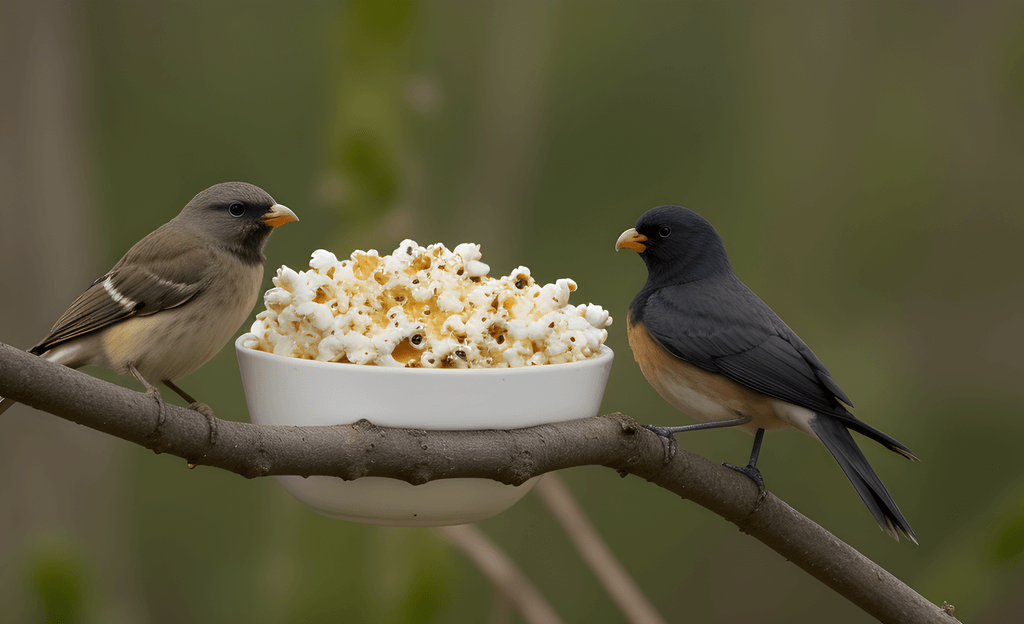
Moderation Considerations
Despite its nutritional benefits, it’s crucial to emphasize that feeding popcorn to birds should be done in moderation due to its high carbohydrate content. While carbohydrates are an energy source, excessive consumption can lead to weight gain and potential health issues for birds.
It’s vital for bird owners to understand that while nutrition plays a critical role in their pets’ well-being, balance is key. Too much or too little of any particular nutrient can have adverse effects on a bird’s health. Therefore, incorporating various foods into their diets ensures they receive all necessary nutrients without overindulging in one specific type.
From my personal experience with caring for pet birds, I’ve learned that maintaining a balanced diet involves offering diverse food options while being mindful not to rely heavily on any single type or category of food.
Appropriate Popcorn Varieties for Birds
Ideal Popcorn Options
Plain, unsalted, and unbuttered popcorn is the most suitable variety for birds. Simplicity is key. Opting for organic, non-GMO popcorn can further enhance the nutritional value of this snack.
Popcorn that is free from artificial flavors, excessive salt, or heavy butter coatings should be prioritized when offering it to birds. These additives can be harmful to their digestive systems and overall health.
I find that providing a small amount of plain popcorn as an occasional treat adds variety to my exotic birds’ diet while ensuring they receive essential nutrients in a natural form. It’s important to remember moderation when introducing new foods into their diet.
Inappropriate Popcorn Varieties
Flavored, salted, or heavily buttered varieties of popcorn are unsuitable for birds. The additives and excess seasoning present in these options can pose potential health risks to our avian companions.
When considering whether birds should eat popcorn, it’s crucial to avoid any varieties that have undergone extensive processing or contain artificial ingredients. This ensures that the snack remains beneficial rather than detrimental to their well-being.
Personally speaking, I’ve witnessed how certain types of flavored popcorn can cause digestive issues and lead to discomfort for my exotic bird species. Therefore, sticking with plain and natural alternatives has been instrumental in maintaining their health.
Consideration for Various Types of Birds
Different types of birds may have varying dietary requirements and preferences. For instance, larger parrot species might enjoy whole kernels as a stimulating treat due to their strong beaks and advanced problem-solving abilities.
On the other hand, smaller songbirds might benefit from crushed or broken pieces of plain popcorn as an occasional supplement alongside their regular seed-based diets. Understanding the specific needs of each bird type enables us to tailor our offerings accordingly.
In my experience caring for various types of exotic birds, I’ve learned that adapting portion sizes based on individual preferences plays a significant role in ensuring all my feathered companions receive adequate nutrition without overindulging.
Species-Specific Impact of Popcorn on Birds
Larger Parrots
Larger parrots, such as macaws and cockatoos, may be able to handle whole kernels of popcorn better than smaller birds. Their strong beaks and robust digestive systems are more equipped for processing whole grains. However, it’s crucial to remember that even within the same species, individual birds may have different reactions to popcorn treats.
It’s important to monitor your bird’s response when introducing any new food into their diet. While larger parrots may enjoy the occasional whole kernel as a treat, moderation is key. Too much popcorn can lead to an imbalance in their nutritional intake.
Small Birds
For small birds like finches or budgerigars, finely crushed or ground popcorn might be a safer option if you choose to offer them this snack. This makes it easier for them to consume and digest without risking choking hazards from large pieces.
When considering offering finely crushed popcorn as a treat for small birds, observe how they interact with it initially. Some individuals may show little interest in this type of food altogether while others might happily indulge in the occasional nibble.
I’ve found that my own budgerigar enjoys picking at tiny pieces of plain air-popped popcorn occasionally but doesn’t seem overly enthusiastic about it compared to other treats like fresh fruits or vegetables.
Healthy Alternatives to Popcorn for Bird Treats
Fresh Fruits
Fresh fruits like apples and berries are nutritious options for birds. They provide essential vitamins and minerals, offering a healthy snack alternative to popcorn. Birds enjoy the sweetness of fruits, making them a tasty treat that also provides vital nutrients.
Offering fresh fruits can be a stimulating experience for birds as they get to explore different textures and flavors. For example, watching a bird peck at an apple slice can be quite entertaining. It’s important to remember that some fruits like avocados are toxic to birds, so it’s crucial to research which fruits are safe before offering them.
Nutritious Seeds
Nutritious seeds such as millet and sunflower can be offered as treats for birds. These seeds are packed with essential nutrients, providing a nutritious treat option that is both delicious and beneficial for their health.
Incorporating these seeds into the bird’s diet not only adds variety but also ensures they receive important nutrients like healthy fats and proteins. Watching the birds crack open sunflower seeds or pick at millet sprays can be an enriching experience for bird owners.
I’ve found that my own pet bird particularly enjoys munching on sunflower seeds as an occasional treat; it keeps her engaged and satisfied while adding nutritional value to her diet.
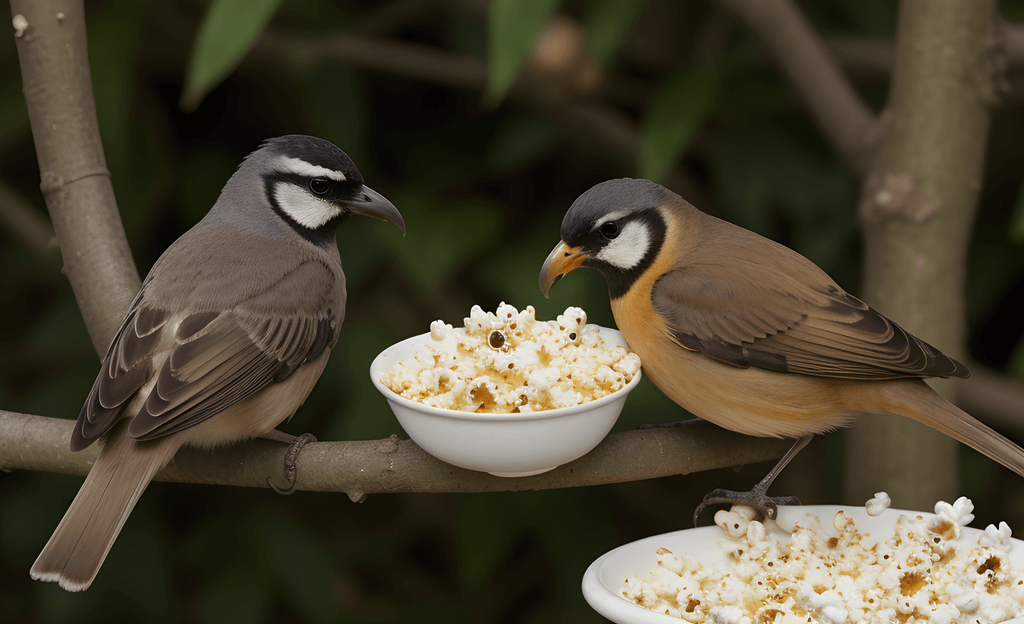
Commercially Available Bird Treats
Commercially available bird treats designed specifically for avian diets are suitable alternatives to popcorn. These treats often contain a blend of natural ingredients tailored to meet the dietary needs of various bird species.
Bird owners have the convenience of choosing from a wide range of commercially available treats that cater to specific preferences or nutritional requirements of their feathered friends. These products offer an easy way to provide stimulating snacks without compromising on nutrition or taste.
When introducing new treats into your pet bird’s diet, it’s essential to do so gradually in order not upset their digestive system; this is something I learned through personal experience when I first introduced commercial bird treats.
Guidelines for Bird-Specific Popcorn Feeding
Occasional Treat
Feeding Birds:It’s essential to offer a varied diet. While popcorn can be an enjoyable snack for larger birds, it should only be given as an occasional treat. A balanced diet is crucial for their overall health and well-being.
Popcorn, when offered sparingly, can provide some entertainment and mental stimulation for larger birds. However, tips from avian experts emphasize the importance of not making popcorn a regular part of their diet. Instead, prioritize feeding them with nutritious options such as fruits, vegetables, seeds, and pellets.
Portion Control
Larger Birds: For larger birds, portion control is key. It’s important to limit the amount of popcorn provided to prevent overindulgence. Overeating popcorn or any other high-calorie treats could lead to obesity and nutritional imbalances in birds.
When considering giving your feathered friends some popcorn as a treat, ensure that the portion size is small and manageable. This will help maintain a healthy balance in their diet while allowing them to enjoy the occasional novelty of this popular human snack.
I’ve found that limiting the portion size also prevents wastage since uneaten food left in bird feeders can attract pests or spoil quickly if not consumed by the birds.
Monitoring Reactions
After introducing popcorn into a bird’s diet regimen, it’s crucial to monitor any adverse reactions they may have. Some birds might have sensitivities or allergies towards certain foods like corn-based products including popcorn.
Keep an eye out for any changes in behavior or physical symptoms after offering them this treatment. If you notice any negative reactions such as digestive issues or unusual behavior patterns after consuming popcorn, consider removing it from your diet entirely.
Comprehensive Dos and Don’ts for Bird Popcorn Treats
Offering Popcorn to Birds
Birds should eat popcorn as an occasional treat when it is plain, unsalted, and unbuttered. This tasty treat can be a part of their balanced diet if given in moderation. Cockatiels, for example, can enjoy popcorn as long as it’s a small part of their overall diet.
Popcorn is low in calories and high in fiber, making it a suitable snack for birds when provided in the right form. It can offer mental stimulation and variety to their diet while being a fun treat for them to munch on.
I have found that my cockatiel enjoys the occasional popcorn treat, but I always make sure it’s plain and free from any harmful additives or flavorings.
Avoiding Harmful Varieties
It’s crucial not to give birds flavored or heavily seasoned popcorn varieties. These types often contain ingredients like salt, sugar, cheese powder, or artificial seasonings that could be harmful to birds’ health. Such additions may upset their delicate digestive systems or lead to other health issues.
When offering treats like popcorn to our feathered friends, we must prioritize their well-being by ensuring that the snacks are safe and beneficial for them. Consulting with an avian veterinarian about incorporating popcorn into your bird’s diet is essential because they can provide tailored advice based on your bird’s specific needs.
I’ve learned from experience that consulting with an avian veterinarian before introducing new treats has helped me understand what works best for my pet bird’s individual dietary requirements.
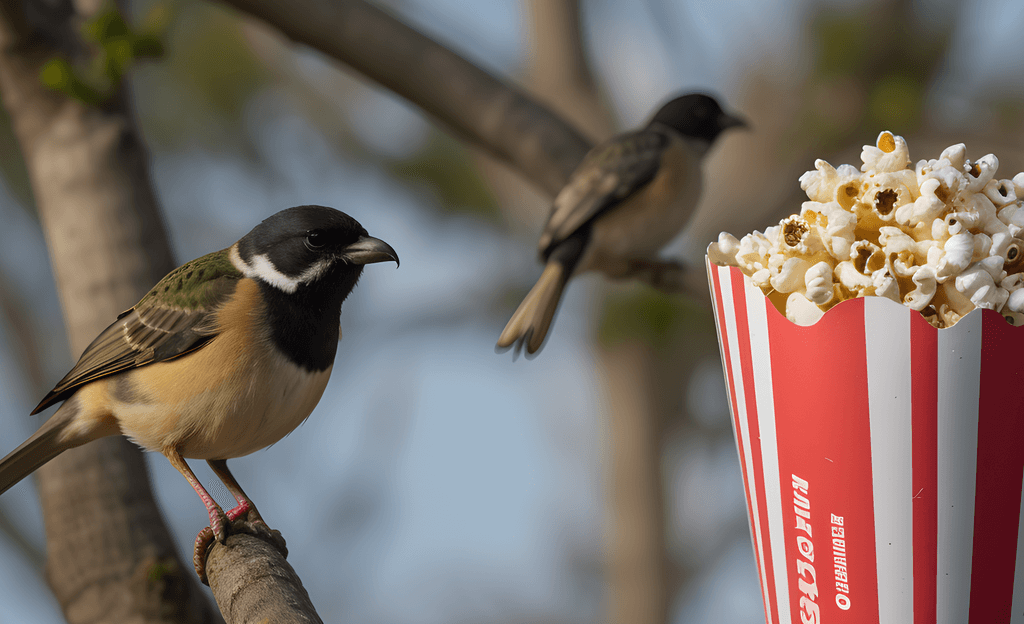
Moderation Is Key
As with any treat, including popcorn, moderation is key when feeding it to birds. While this snack can be a delightful addition to their diet occasionally, overindulgence may lead to nutritional imbalances or obesity in some bird species.
Balancing tasty treats with nutritious foods ensures that our feathered companions receive the necessary nutrients without compromising their overall well-being.
Closing Thoughts
After delving into the complexities of incorporating popcorn into a bird’s diet, it’s clear that while it can be a permissible treat, caution and moderation are paramount. Understanding the nutritional impact and potential hazards of popcorn for birds equips me to make informed decisions that prioritize their well-being. Healthy alternatives and species-specific considerations further highlight the importance of tailored care for our feathered friends.
As I navigate the world of avian care, I am reminded that even well-intentioned threats can have unintended consequences. By applying the guidelines and insights gathered here, I can ensure that my avian companions receive the best possible care. Let’s remember that every choice we make for our pets plays a crucial role in their overall health and happiness.
Frequently Asked Questions
Should I feed my pet bird popcorn as a treat?
Popcorn can be an occasional treat for pet birds, but it should be given in moderation. Plain, air-popped popcorn is the best option, and avoid adding any seasoning or butter. Always consider your bird’s specific dietary needs and consult with a veterinarian.
Is popcorn safe for all types of birds?
While some birds may enjoy the occasional plain, unsalted popcorn as a treat, it’s important to note that not all species tolerate it well. Some birds may have difficulty digesting this snack or are prone to choking on unpopped kernels. Always research your bird’s species-specific dietary requirements before offering any new treats.
Can I give flavored popcorn to my pet bird?
Flavored or seasoned popcorn should be avoided when feeding birds. The additives and flavorings in these varieties can be harmful to their digestive systems and overall health. Stick with plain, air-popped popcorn as an occasional and minimal treat for your feathered friend.
How often can I offer popcorn to my pet bird?
As with any treat, moderation is key when feeding your pet bird popcorn. It should only be given occasionally and in small amounts as part of a varied diet. Too many high-carb snacks like popcorn can lead to obesity and other health issues in birds.
Are there healthier alternatives to feeding my pet bird instead of giving them popcorn?
Yes! There are plenty of healthy alternatives you can offer your pet bird instead of relying solely on popcorn treats. Fresh fruits like apples or berries, vegetables such as carrots or bell peppers, or specially formulated commercial avian treats provide better nutritional value without the potential risks associated with consuming too much starchy snacks like popcorn.
